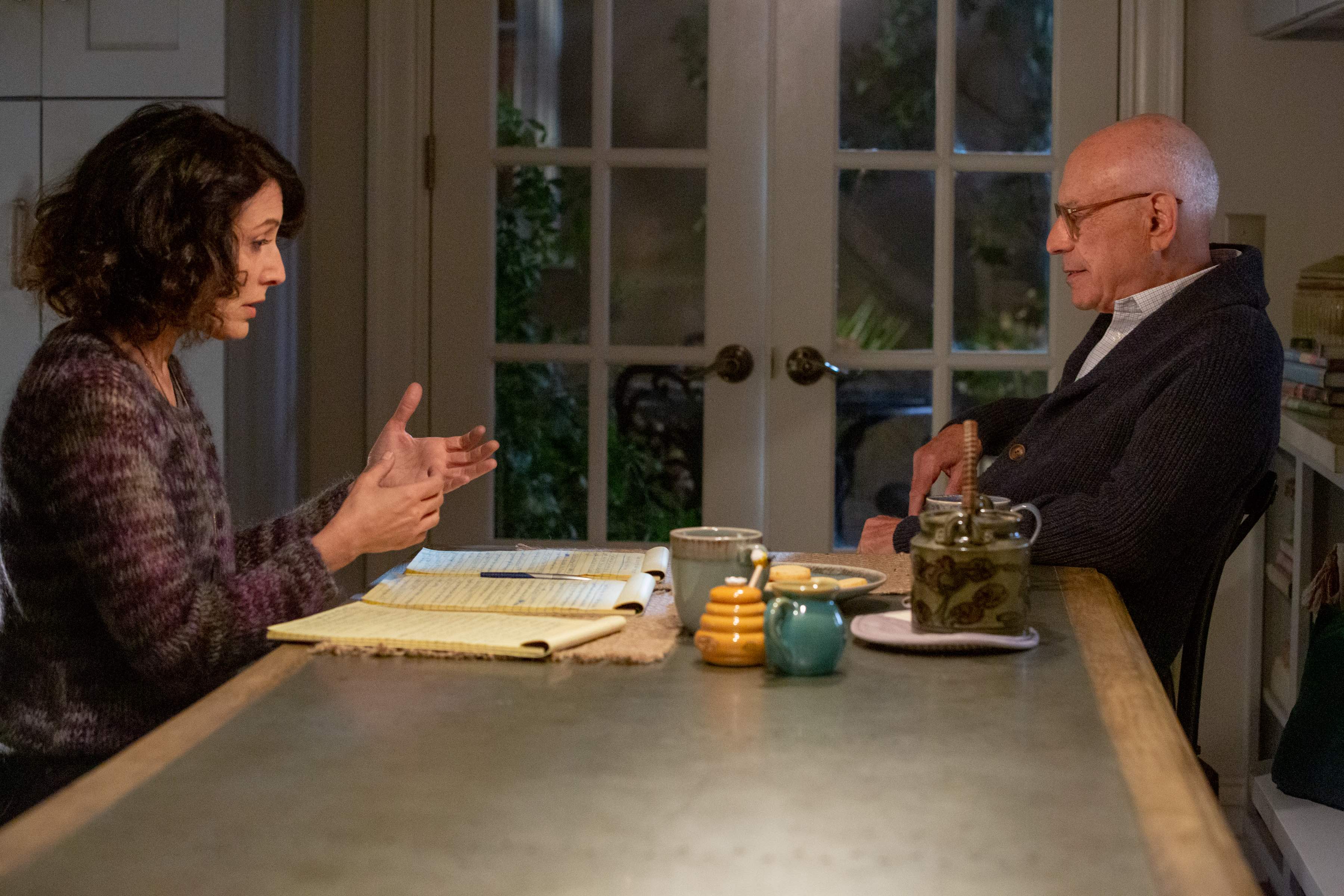It’s impossible to get through any day without experiencing moments that are both funny and sad. That balance is the anchor of Chuck Lorre’s The Kominsky Method, which recently dropped its second season on Netflix. This dramatic-comedy equilibrium also helped draw actress Lisa Edelstein to the Michael Douglas and Alan Arkin–led project, in which she plays Arkin’s drug-addicted daughter who’s struggling to reconnect with her father and reckon with her past following her mother’s death.
The fraught relationship between Norman Newlander (Arkin) and the spiraling Phoebe (Edelstein) is but one example of how the series excels at handling expressions of grief, the encroachment of death, and the perpetual battle to look past minute differences between ourselves and the people we’re close to.
Edelstein has made a name for herself over the last few decades in mixed-genre shows like House and The West Wing, both leaning on comedy to balance out heavy premises. And here, too, she expertly blends hysterics and hysteria in her portrayal of Phoebe.
We caught up with the veteran actress following the release of The Kominsky Method’s second season to talk about the isolation of grief and why dramadies feel so rooted in real life.
I imagine it’s a lot of fun to play Phoebe, because she’s such a mess—but an endearing mess. Did you find yourself reaching back into memories from your own carefree teen years?
It’s really about remembering the fury of adolescence. Phoebe is just a very, very adolescent grownup. She’s a beautiful combination of spoiled and ignored, over-catered-to and under-listened-to. This year she makes a very earnest attempt at trying to get her act together and you get to see a bit of the dynamic with her father that built some of the issues she’s had. I don’t see Phoebe as having no cares in the world; I see her as being a petulant, angry fourteen-year-old, acting out until someone notices. It’s like she’s been waiting for her father to see all that, so she can finally let it go and grow up. But this season she does it without him. She has been through rehab, taken it seriously, and is trying to get her father to take it seriously too, which is not so easy.
What do you like about how the show illustrates grief and coping mechanisms?
There’s little we can experience that is as isolating as grief. Even amongst family members, as clearly portrayed in the case of this story. Not only can grief isolate you, other people’s grief can feel like an attack, or just plain wrong, which further pushes them away. Alan’s character has found a way to be with his late wife that comforts him, that keeps her alive. Whereas Phoebe, she’s just lost. It’s like she never connected at all, and now her mother is a vacuum of never-had-ness. So she is angry and avoiding her feelings and taking it out on her father. To me, it speaks a lot to the issue of living while grieving. When you grieve, you want everything to stop, to freeze, to give you a second to process. But time pushes forward. Relentless.
“Finding a show that doesn’t make you feel like you have to leave half your brain at the door is very exciting.”
What about your character specifically?
I think it was really important to the producers, Chuck [Lorre] and Al [Higgins], that Phoebe not just be a punchline. They made it clear to me this season that she is really trying, very earnestly applying herself and determined to become the woman she is capable of being. After all the antics of season one, they wanted to make sure we saw her as a human being, complicated, still a little fucked up, but definitely in recovery. Everyone has a version of themselves that is better. She’s been living so long in her disease of addiction and her attachment to her anger issues, that remembering who she is under all that is going to be a process. A hilarious one, of course, but a real process.
You have a long history with starring in dramadies. Why do you find yourself drawn to the genre?
I love dramedies mostly because they don’t force me to choose between drama and comedy. I get to do it all and sometimes sing! OK, no one really wants me to sing all that much, but sometimes I do anyway. Honestly, I just love my job and I love good writing—and wherever I can find it, in whatever genre, I’ll happily go for it.
What makes for a great TV series, in your eyes?
It starts with great writing. Finding a show that doesn’t make you feel like you have to leave half your brain at the door is very exciting. And then performance. Seeing amazing actors take material over the moon is a thrill. I love watching shows. I learn so much from watching, even if it sucks. Sometimes watching shows that aren’t working is more informative. You can see the gaps, you can question how you might fix them or play it differently. It’s all about learning in those cases. But for my own entertainment, I watch all kinds, from Game of Thrones and Black Mirror, to Succession and Fleabag, with lots of sci-fi and zombies and cool old movies thrown into the mix. FL









